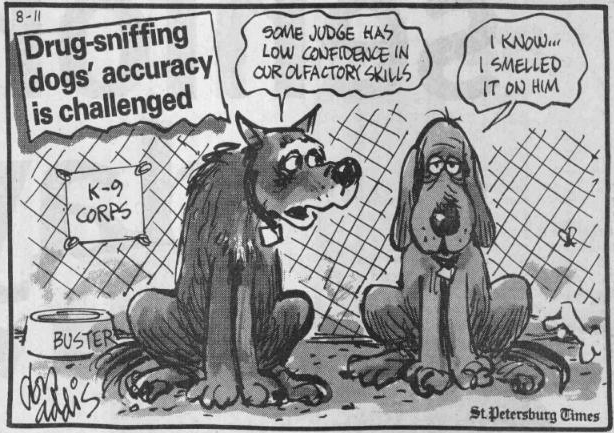
The government wants to overturn a victory against drug-dogs by taking
the case all the way to the U.S. Supreme Court. Florida's Attorney General
is fighting against Florida v. Matheson and its requirement that narcotic
K-9s must be continually trained and tested under higher standards or they
cannot be used to search people and cars.
Are dogs used as ruses against humans, to violate constitutional rights against searches and seizures?
* Some cops ask to search cars for no reason at all during routine traffic
stops. Some cops ask to search because they know that most victims do not
know that they can "just say no" because they are know-nothings about constitutional
rights. Those who do know are often too meek to "just say no." It is unknown
how often cops ask for consent to search and how often consent is given in
ignorance or duress. People who do not complain roadside, will not complain,
learn or litigate later.
* When drivers say "no," then some cops tell drivers that an ordeal is
inevitable because the cop radioed for a canine and it is coming to the scene.
It is often a lie to induce consent. There is no dog on the way.
* If a dog is or is not "on the way," some cops add additional lies to
make drivers think that there will be a long wait and that the driver must
stay until a dog arrives. Cops rely on driver ignorance of the fact that
evidence will be suppressed if drivers are detained longer than it takes
to complete the traffic stop (e.g. write the ticket). Drivers are induced
to consent to search to avoid a long wait based on lies.
* If a dog is en route, some cops let drivers think that they are obliged
to stay even when the cop has no reason to detain drivers any longer. Cop's
rationalize that drivers inexplicably loiter roadside with cops, or that
drivers enjoy waiting for dog sniffs. Cops take advantage of drivers who
are too stupid (or too meek) to ask if they are free to go, so that drivers
"consent" to unwarranted detention by not leaving.
* Cops lie about how long it takes to write tickets or to obtain a radio
response on tag inquiry. If a dog is actually en route, then some cops write
tickets very slowly, until the dog arrives.
* When cops need consent, and drivers say "no," then there is no basis
to search. Without consent, cops need "probable cause" to search. Cops can
create cause by claiming that canines alerted, even if there are no alerts,
or canines can be cued. A search is forced against the driver's will. In
January 2005, the U.S. Supreme Court ruled in Illinois vs. Caballes that a dog sniff during a traffic stop was not a "search." Caballes
and similar cases turn canines into props for lies. When dogs are used as
props for lies, it doesn't matter whether dogs are well-trained.
* If a dog alerts and nothing is found, then cops will never record that
as an error. If cross-examined later, they will testify that the dog detected
lingering odors of contraband that were recently present. Cops will testify
that dogs never make mistakes, never have and never will, and that apparent
errors are skillful detections of lingering (residual) odors of contraband.
No one can question a dog about whether the cop is lying or mistaken, and
it is usually a waste of time to ask a cop the same types of questions.
* Many errors by drug dogs cause lawyers to wonder if police carry drugs
to plant scents so that drug dogs will alert. Some news items support such
speculation in cases where drugs have been planted by police. Drug laws are
wrong in the first place, and in the second place drug laws cause more wrongdoing
by government during enforcement.
Government's attitude toward your liberty is like a dog at a fire hydrant.
Police-state tactics witnessed worldwide via videotape from Goose Creek High
School in South Carolina, where children were forced to the floor in handcuffs
and terrorized by dogs and cops with guns drawn. Nothing was found. In other
schools, classes have been interrupted and the children were marched out
and lined up to be harassed by a dog.
The Caballes case foreshadows more police-state possibilities: Uniformed
law enforcement marching through neighborhoods with German shepherds on leashes
sniffing anything and everything -every car parked on or near the street,
the air emanating from homes, neighbors walking outside. Imagine the same
thing at any place of business or employment, and police marching German
shepherds through parking lots, car to car, for no reason other than fishing
expeditions. Imagine the same nightmare in any shopping area or a downtown
street area, a festival, a bar's parking lot, with uniformed agents with
German shepherds sniffing pedestrians and their bags and cars and anything,
and stopping anyone on an alleged alert and going through their purses, persons,
cars, etc, right there on the street.
Drug dogs are like humans in that they must be taught to approach peaceful
people and search them, so that humans can be arrested, handcuffed and imprisoned
for decades under modern prohibition. That is not an easy trick to teach
a dog. It is easier to teach humans.